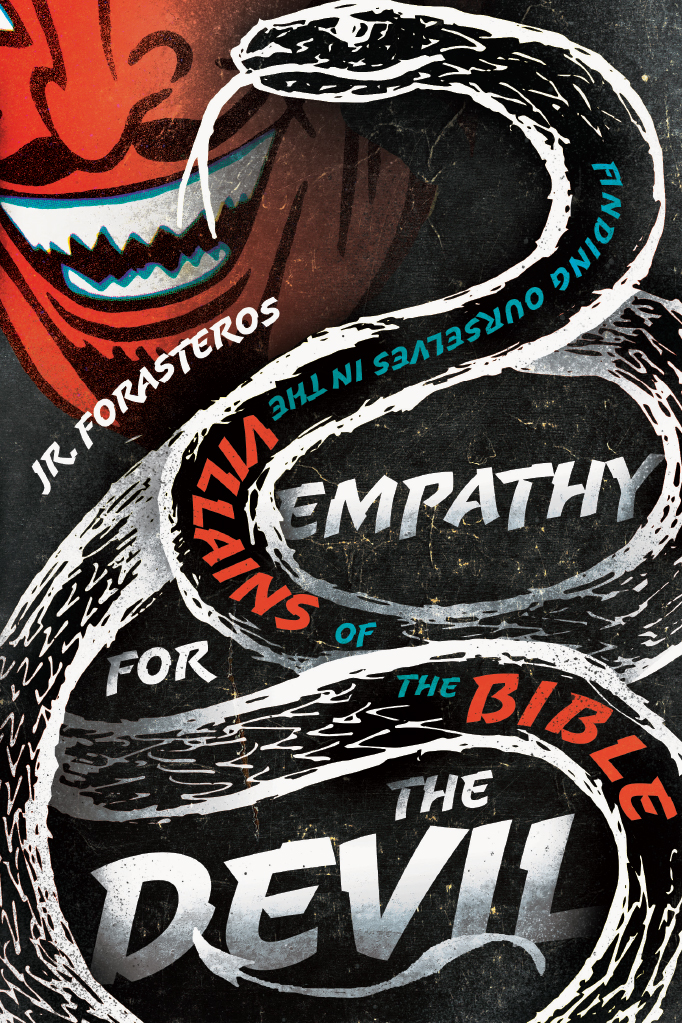In the first ten minutes of reading Empathy for the Devil, I found myself in the midst of a real therapeutic breakthrough. JR Forasteros's take on the biblical Cain provides a great perspective on anger and the place it holds in our lives. This is just one of the seven biblical villains Forasteros examines - each with a narrative account and a chapter of practical contextualization - concluding with the devil himself. Each section brings to bear the realities of a gray world on characters we almost always view in black and white. By helping us to inhabit the lives and minds of these "others," we see ourselves in them and increase our empathy.
Each chapter contains really deft biblical analysis and the best of professional exegetical understanding, but also viscerally connects the reader to the people and places of the Bible. As a jaded seminary graduate, I'm well accustomed to reading books of this nature - putting a unique twist on an old story - with a bit of skepticism. They're often academically weak or oversimplified; Empathy for the Devil is neither. It's rigorous and challenging, while also providing space for the reader to ruminate and draw her own conclusions.
In full disclosure, I did receive a free advance copy of this book with a real implication (but not an actual request) that I review it. JR Forasteros is someone I know a little bit and like quite a lot - so, as much as I'd like to claim total neutrality, you'll have to take all of this with a grain of salt. I will say that our interactions have been largely online, along with one 90 minute conversation over coffee in the lobby of the Horizon League headquarters in Indianapolis.
That being said, this book provides the kind of practical invitation to conversation that could work well in any setting where people are comfortable enough to be honest and ask tough questions. From Intervarsity Press, it's likely to be marketed to a religious audience, but the cultural traction so many of these characters have even outside Christian faith should make it at least accessible to anyone interested in a hopeful, but sadly atypical perspective.
The final chapter, on Satan, is undoubtedly the best - which is saying something, since I was told as much about halfway through the book and was so enjoying myself I refused to believe it. Forasteros presents a difficult, tension-fraught subject with a calm and rational - even generous -
approach. It is indeed hard to empathize with the devil and not something any of us particularly wants to do. Yet Forasteros earns the benefit of the doubt with the preceding six chapters and narratively weaves a beautiful expression of grace and love into the midst of great tragedy in a way that both informs and engages.
I don't like to do these reviews without some critique, but there's not much really to pick at in Empathy for the Devil. If anything, though, this is the kind of book that requires a certain kind of audience. You could use it in a congregation, but you'd need an exceptionally open-minded, secure group of people to embrace it well. You could also bring it to book club, but it might dredge up some difficult subject matter if people don't know each other well enough (although, appropriately, one of the chapters talks about the different levels of interpersonal intimacy and how to navigate the awkward growth of community) - at the same time, it's just too rich and pertinent to ignore.
One of the most insidious problems in our world is the tendency we have to create "us" vs "them" dichotomies; Empathy for the Devil works against that it the most honest and grace-filled ways. I don't think there's any higher praise I could give it.

1 comment:
Thank you so much, Ryan! I am gratified and humbled by this thoughtful and careful read of the book. And really proud to be featured on your blog!
Post a Comment